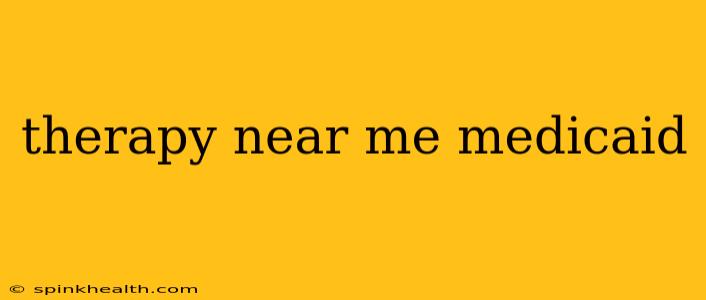Finding Affordable Therapy: Navigating Medicaid Coverage and Local Options
The search for mental health support can feel overwhelming, especially when financial constraints are involved. Many people rely on Medicaid to access essential healthcare services, including therapy. This guide will walk you through the process of finding therapists who accept Medicaid near you, addressing common questions and concerns along the way.
Imagine this: You're struggling with anxiety, feeling isolated, and unsure where to turn. The thought of therapy offers a glimmer of hope, but the cost feels insurmountable. This is where understanding your Medicaid benefits and available resources becomes crucial. Let's unravel the process together.
What types of therapy are covered by Medicaid?
Medicaid coverage for therapy varies from state to state. While many plans cover individual and group therapy sessions, the specifics—like the number of sessions covered annually and the types of therapists included—can differ significantly. Some states may also cover specific therapeutic approaches, while others offer broader coverage. Contact your state's Medicaid office directly to understand the specifics of your plan's coverage. They are your best source of accurate, up-to-date information. This is often the first and most crucial step in your search.
How do I find therapists near me who accept Medicaid?
Finding a therapist who accepts Medicaid involves a multi-pronged approach. First, utilize your state's Medicaid website. Many states have online directories of providers who participate in their Medicaid programs. This is a valuable starting point.
Next, consider using online search engines. Search terms like "Medicaid therapists near me," "mental health services Medicaid," or "[your city/state] Medicaid therapy providers" can yield relevant results. Be sure to check each therapist's website or contact them directly to verify their current acceptance of Medicaid.
Finally, don't underestimate the power of word-of-mouth. Reach out to your primary care physician, social worker, or trusted friends and family members for recommendations. Sometimes, personal referrals can be surprisingly effective.
What if I can't find a therapist who accepts Medicaid?
Finding a therapist who accepts Medicaid can sometimes be challenging. If your initial search proves fruitless, don't give up hope. Several avenues remain:
- Contact your state's Medicaid office: They may have additional resources or be able to direct you to alternative options.
- Explore community mental health centers: These centers often offer sliding-scale fees, meaning the cost of therapy is adjusted based on your income.
- Investigate free or low-cost clinics: Many communities have clinics that provide mental health services on a limited-income basis or for free.
- Look into telehealth options: Teletherapy expands the pool of potential therapists, as geographical limitations become less restrictive.
What questions should I ask potential therapists?
When contacting therapists, be sure to ask specific questions related to your needs and Medicaid coverage. For example:
- Do you accept my specific Medicaid plan? (Provide the plan name and number if possible.)
- What types of therapy do you offer? (Cognitive Behavioral Therapy, Dialectical Behavior Therapy, etc.)
- What are your fees and payment policies? (Confirm how Medicaid billing works.)
- What is your experience treating my specific concerns?
- Do you offer telehealth appointments?
Thoroughly vetting potential therapists is crucial to ensuring a comfortable and effective therapeutic relationship.
How long does it take to find a Medicaid-approved therapist?
Finding the right therapist can take time and patience. Be prepared to make several calls and explore different options. Don't get discouraged; persistence pays off. Remember, finding the right therapeutic match is vital for your well-being.
Remember, accessing mental healthcare is a vital step towards improved well-being. With a little research and perseverance, you can find affordable therapy that meets your needs and fits within your Medicaid coverage. Don't hesitate to reach out to the resources mentioned above. Your journey towards better mental health begins with taking this crucial first step.

